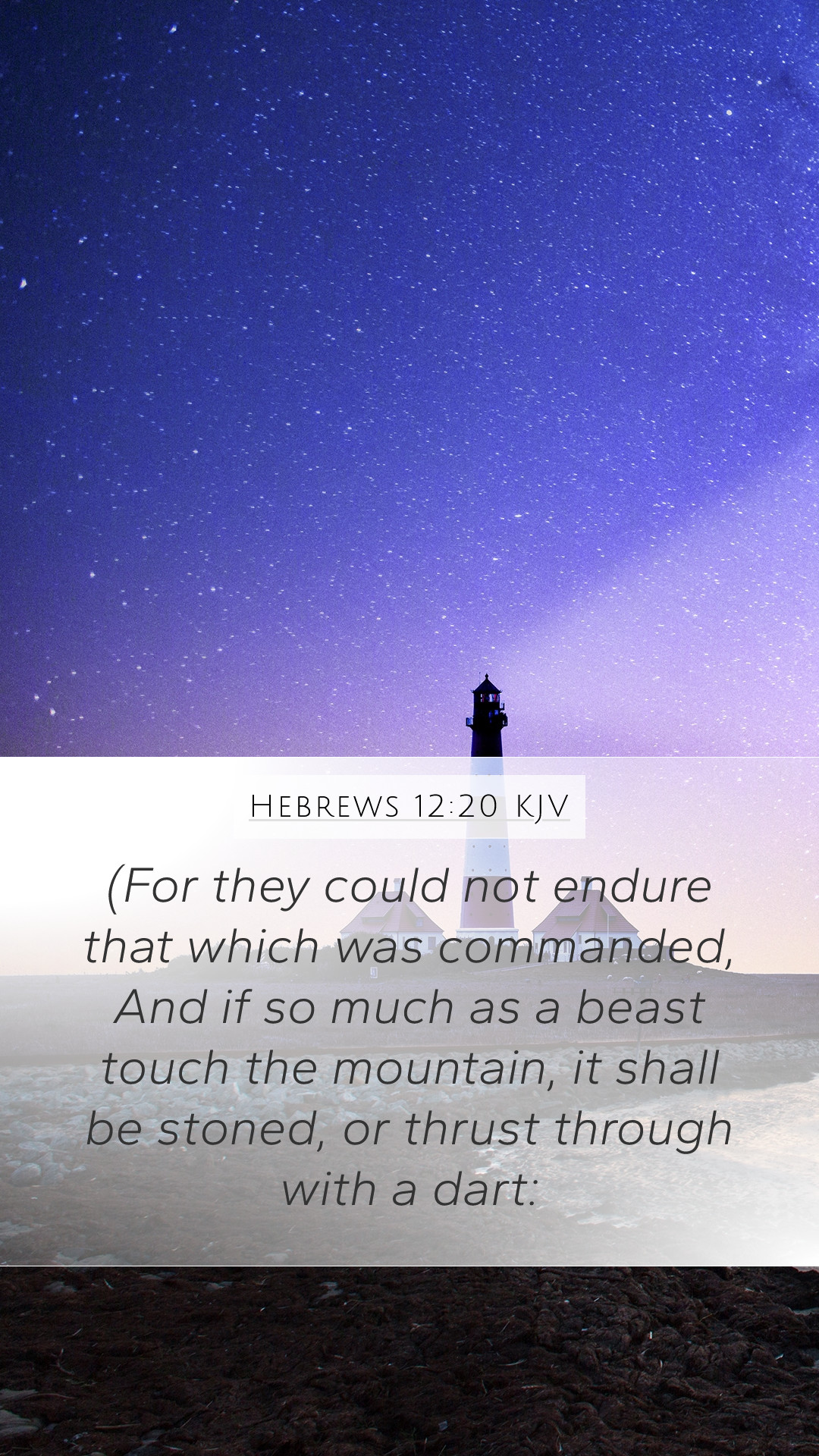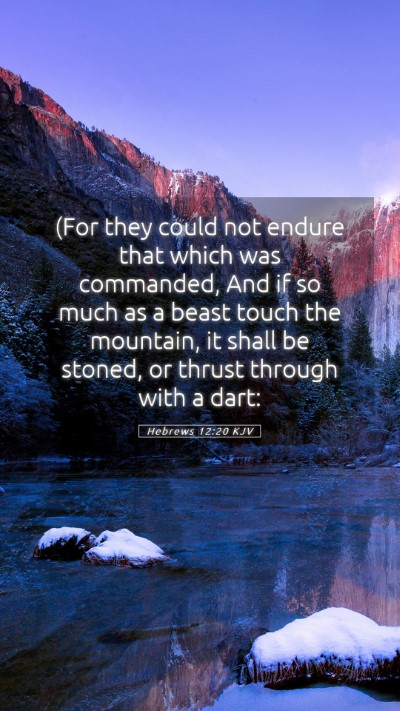Understanding Hebrews 12:20
In exploring the meaning of Hebrews 12:20, we delve into a verse that encapsulates significant themes of fear, reverence, and the covenantal relationship between God and His people. This verse speaks about the fear that was evoked during the giving of the Law at Mount Sinai, indicating a crucial moment in biblical history that informs our understanding of God's holiness and justice.
Verse Context
The context of this scripture is vital. The writer of Hebrews draws a contrast between the Old Covenant, represented by the events at Sinai, and the New Covenant through Christ. The verse specifically refers to the terror experienced by the Israelites when they received the Law, portraying the imposing nature of divine authority.
Verse Text
Hebrews 12:20: "For they could not endure that which was commanded, and if so much as a beast touch the mountain, it shall be stoned, or thrust through with a dart."
Commentary Insights
- Matthew Henry's Commentary: Henry emphasizes the overwhelming fear and dread that accompanied God's proclamation of the Law at Sinai. This fear was not just a natural reaction but a profound recognition of God's holiness and the seriousness of His commands, underscoring the separation between a holy God and sinful humanity.
- Albert Barnes' Notes: Barnes elaborates on the consequence of approaching God's holiness unprepared. The verse illustrates that even animals were warned against touching the mountain, reinforcing the severity of God’s commandments. This reflects God's justice and the need for reverence in His presence.
- Adam Clarke's Commentary: Clarke pays attention to the symbolism of the mountain and its representation of God's presence. He notes that the fear experienced by the people was a direct response to the perception of divine power and judgment, which pointed towards the necessity of mediation – a theme that culminates in the New Covenant through Jesus Christ.
Key Themes and Analysis
-
Divine Holiness and Judgment
This verse serves as a stark reminder of God's holiness. The prohibition against touching the mountain illustrates that God's presence is not to be taken lightly. The fear of punishment reflects the truth in Scripture that God is both loving and just. The same God who desires relationship also demands reverence.
-
Covenantal Implications
The reference to the Law at Sinai points to the covenant dynamics between God and Israel. Hebrews 12 contrasts the fear associated with the Old Covenant with the grace offered by Christ. Understanding this shift helps readers grasp the significant transition from fear to faith in the New Covenant.
-
Faith vs. Fear
The emphasis on fear at Sinai raises an important question about the nature of faith. Believers today are called to approach God with confidence, yet this confidence is rooted in an understanding of His holiness. Thus, while fear may be an initial reaction to God’s presence, it is transformed into awe and reverence through relationship with Christ.
Application in Daily Life
The meaning of Hebrews 12:20 invites believers to reflect on their own approach to God. Here are some practical ways to apply this insight:
- Embrace a Holistic Understanding of God: Acknowledge both His love and His holiness. Understanding God's character leads to a balanced faith that embraces both aspects.
- Develop a Habit of Reverence: Implement practices in prayer and worship that honor God’s holiness. This can involve quiet meditation, solemn prayer, or the use of Scripture in worship settings.
- Engage in Scripture Study: Use Hebrews 12:20 as a launching point for deeper study into the nature of God and His covenants. Explore related texts that illuminate the character of God.
Cross References
The following verses complement the themes discussed in Hebrews 12:20:
- Exodus 19:12-13: Instructions on safeguarding the mountain during the giving of the Law.
- Deuteronomy 5:22-27: The people's fear at the mountain and their request for Moses to mediate.
- Hebrews 10:31: "It is a fearful thing to fall into the hands of the living God," reinforcing the seriousness of God's power and judgment.
Conclusion
Hebrews 12:20 encapsulates critical aspects of God's nature and relationship with humanity. By examining this verse through commentaries and contextual analysis, believers can gain profound insights into the fear of God, the dynamics of His covenants, and the transformative power of approaching God through Christ. Understanding Scripture in this way not only enriches personal faith but also enhances our collective insights in Bible study groups.
This analysis serves as a guide to deepen personal engagement with the text and enhances Bible study lessons, providing tools for understanding difficult Bible passages. As we reflect on the reverence due to God, may we be encouraged to proclaim and live out the truths of Scripture as faithful witnesses.


